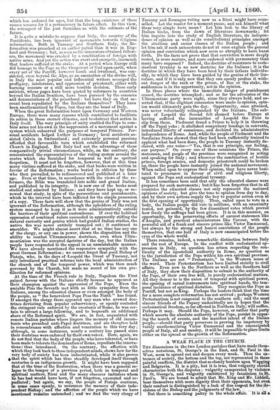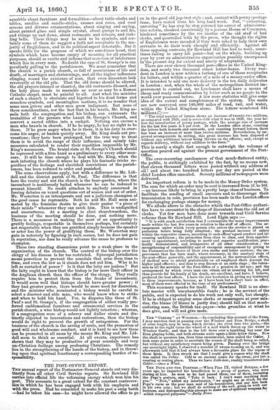A WEAK PLACE IN THE CHURCH.
Tan dissensions in the two London parishes that have made them- selves notorious, St. George's in the East, and St. Paul in the West, seem to spread out and deepen every week. Thus the ex- tremes of society, the bottom and the top, are represented in these painful conflicts, the district that so closely borders upon Wapping and Belgravia. It is a pity, but it is true, that vulgarity should characterize both the disputes ; vulgarity exasperated by violence in St. George's, and vulgarity embittered by fanaticism in St. Paul's. We are bound to admit that Mr. King and Mr. Liddell, bear themselves with more dignity than their opponents, but even their conduct is distinguished by a lack of due respect for the de- cisions of the Bishop and the judgments of the law. But there is something paltry in the whole affair. It is all a squabble about furniture and formalities—about table-cloths and tables, candles and candle-sticks, crosses and roses, and rood screens and diverse ornamentations, about singing and saying, about painted glass and simple crystal, about goings to and fro, and risings up and down, about vestments and colours, and tink- ling bells. These things may be said to be symbols, and cer- tainly some of them do suggest a faith not acceptable to the ma- jority of Englishmen, and in its political aspect detestable. But it speaks little for the progress of which we sometimes boast, that symbols which have become empty of meaning for all practical purposes, should so excite and inflame that secretion of intolerance which lies in every man. No doubt the case of St. George's is one peculiarly galling to the parishioners. We must remember that the church is a parish church, so full of associations of life and death, of marriages and christenings, and all the higher influences clinging round the existence of man, that even dissenters look reverently at the old. pile. That the old forms should be altered, the old prayers intoned or chanted, the old vestments disused, and the holy place made to resemble as near as may be a Roman Catholic chapel, must be painful to all. And when the minister of such a church is obstinate and bigotted to his dead forms and senseless symbols, and meaningless motions, it is no wonder that some men grieve and other men grow indignant. But none of these considerations, nor the fact that in his wrath, Mr. King as- sails both the congregation and his bishop, can extenuate the brutalities of the persons who haunt St. George's Church, and convert a sacred edifice into a cockpit. Nothing can excuse a man who brawls in church. If he be angry, he has no right to be there. If he grow angry when he is there, it is his duty to over- come his anger, or hasten quietly away. ifr. King deals out pro- vocations; they have been prolonged, but the true way to treat them is to avoid the range of their influence, and calmly take measures calculated to render their repetition impossible by Mr. King's successors. The brutal riots at St. George's Church should be repressed with a firm hand as a preliminary to every other mea- sure. It will be time enough to deal with Mr. King, when the mob infesting the church where he plays his fantastic tricks re- gardless of the feelings and cherished convictions of the parish- ioners, has been reduced to order and punished.
The same observations apply, but with a difference to Mr. Lid- dell and the district parish of St. Paul. The difference is that here the vestry and not the church is the bear-garden, where the incumbent is assiduously baited whenever he can be induced to present, himself. No credit attaches to anybody concerned in forcing debates on vexed questions out of season and out of order. Mr. Westerton is an intemperate and not a judicious champion of the good cause he represents. Both he and Mr. Hall seem ani- mated by the feminine desire to give their pastor " a piece of their minds" whenever they can catch him. This is undignified and uncourteous. At a meeting to elect churchwardens, the business of the meeting should be done, and nothing more. There is a meanness in making the most of an opportunity to gratify feelings, respectable in themselves perhaps, but certainly not respectable when they are gratified simply because the speaker or actor has the power of gratifying them. Mr. Westerton may gain in notoriety by figuring in such scenes, but he does not gain in reputation, nor does he really advance the cause he professes to champion.
These two standing dissensions point to a weak place in the organization of the church. The control of the bishop over the clergy of his diocese is far too restricted. Episcopal jurisdiction seems powerless to prevent the scandals that arise from time to time, and even the law as it stands does not aid him. Why is he left so curtailed of power ? Is it that the laity are jealous ? But the laity ought to know that the bishop is far more their officer in the Anglican church than the officer of the clergy. They really require him to protect them from the freaks of incumbents. It would seem well that bishops should have greater power ; if they had greater power, there would be more need for discretion, and the minister who nominated a bishop would be careful to select a discreet and able man, who would know when to strike and when to hold his hand. For, in disputes like these of St. Paul's and St. George's, if the congregation of either really pre- ferred emblematical furniture and ornamental services in the parish church, a wise bishop would not lightly interfere ; whereas, if a congregation were of a soberer and duller strain and dis- tinctly objected to innovations and restorations, then the bishop would do right to prevent the growth of antagonism. For the business of the church is the saving of souls, and the promotion of good will and wholesome conduct, and it is hard to see how these can be promoted in all cases by the means Mr. King and Mr. Lid- dell seem to think so essential. At all events, experience has shown that they may be productive of great scandals and very un-Christian feelings among professing Christians. The remedy lies in the strengthening of the hands of the bishop, and in throw- ing upon that spiritual functionary a corresponding burden of re- sponsibility.



























 Previous page
Previous page